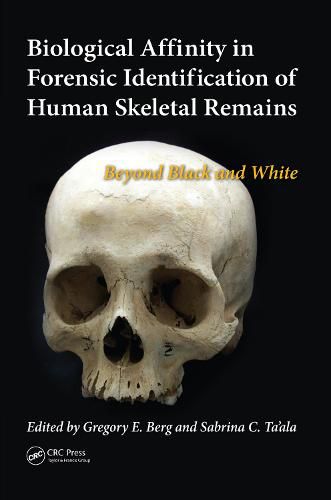Readings Newsletter
Become a Readings Member to make your shopping experience even easier.
Sign in or sign up for free!
You’re not far away from qualifying for FREE standard shipping within Australia
You’ve qualified for FREE standard shipping within Australia
The cart is loading…






Ancestry determination in the identification of unknown remains can be a challenge for forensic scientists and anthropologists, especially when the remains available for testing are limited. There are various techniques for the assessment of ancestry, ranging from traditional to new microbiological and computer-assisted methods. Biological Affinity in Forensic Identification of Human Skeletal Remains: Beyond Black and White presents a range of tools that can be used to identify the probable socio-cultural race category of unknown human remains.
Gathering insight from those who have made recent improvements and scientific advances in the field, the book begins with the historical foundations of the concept of biological affinity and the need for increased research into methods for determining ancestry of skeletal remains. The contributors cover a range of topics, including:
Ancestry estimation from the skull using morphoscopic and morphometric traits and variables
Innovative methods from metric analyses of the postcrania, and new approaches to dental non-metric variation
The biological diversity of Hispanic populations and use of discriminant function analysis and 3D-ID software to determine ancestry
Methods of age progression and facial reconstructions to create two-dimensional (2D) and three-dimensional (3D) facial composites for missing people
The preparation of skeletal remains for DNA extraction and sampling, and mtDNA methods that are available for identification of haplogroups (e.g., ancestral populations)
No single method or technique is adequate in the assessment of ancestry. For accurate determinations, the use of traditional and new techniques combined yields better results. This book demonstrates the large repertoire of tools available to those tasked with these challenging determinations.
$9.00 standard shipping within Australia
FREE standard shipping within Australia for orders over $100.00
Express & International shipping calculated at checkout
Ancestry determination in the identification of unknown remains can be a challenge for forensic scientists and anthropologists, especially when the remains available for testing are limited. There are various techniques for the assessment of ancestry, ranging from traditional to new microbiological and computer-assisted methods. Biological Affinity in Forensic Identification of Human Skeletal Remains: Beyond Black and White presents a range of tools that can be used to identify the probable socio-cultural race category of unknown human remains.
Gathering insight from those who have made recent improvements and scientific advances in the field, the book begins with the historical foundations of the concept of biological affinity and the need for increased research into methods for determining ancestry of skeletal remains. The contributors cover a range of topics, including:
Ancestry estimation from the skull using morphoscopic and morphometric traits and variables
Innovative methods from metric analyses of the postcrania, and new approaches to dental non-metric variation
The biological diversity of Hispanic populations and use of discriminant function analysis and 3D-ID software to determine ancestry
Methods of age progression and facial reconstructions to create two-dimensional (2D) and three-dimensional (3D) facial composites for missing people
The preparation of skeletal remains for DNA extraction and sampling, and mtDNA methods that are available for identification of haplogroups (e.g., ancestral populations)
No single method or technique is adequate in the assessment of ancestry. For accurate determinations, the use of traditional and new techniques combined yields better results. This book demonstrates the large repertoire of tools available to those tasked with these challenging determinations.